Police Scotland can’t cope with the deluge of hate crime complaints under the country’s authoritarian and deeply illiberal new Hate Crime Act, frontline officers have said, amid suggestions that people are exploiting it to settle personal, political and ideological vendettas (Gript, Mail, Telegraph, Times).
Alas, if only there had been academics, solicitors, barristers, celebrities, business owners, musicians, politicians, authors, poets, comedians, journalists, ex-police officers, charities, think tanks, campaign groups and concerned citizens around to warn the SNP-led Scottish Government this was likely to happen when the legislation was finally activated on April 1st…
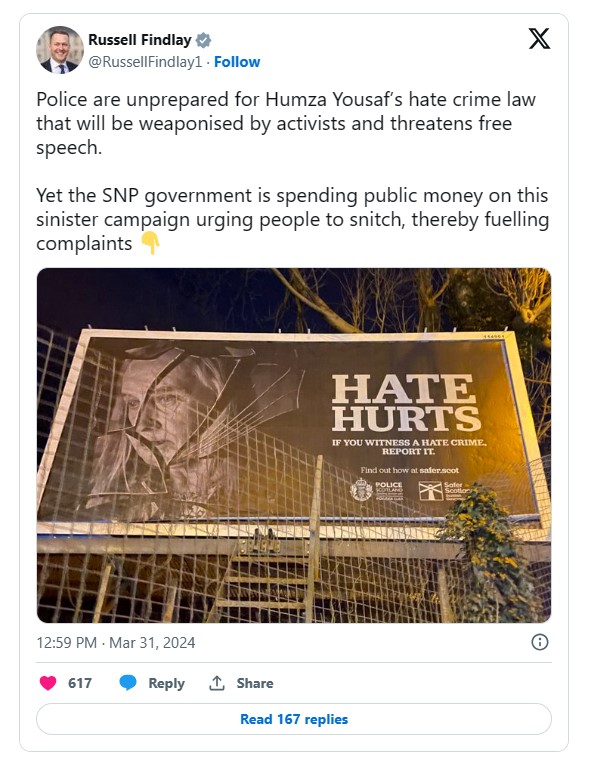
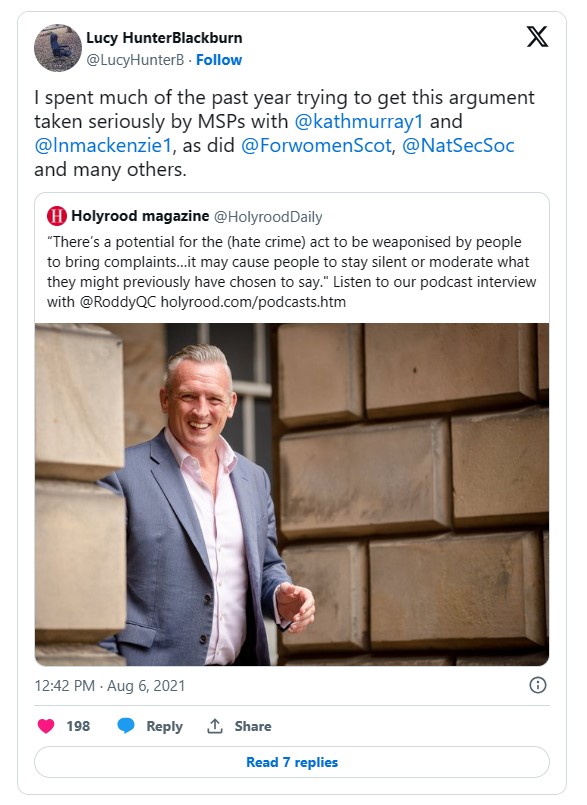
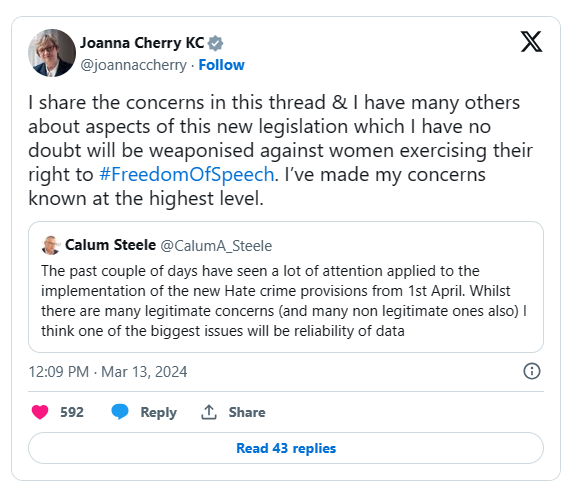
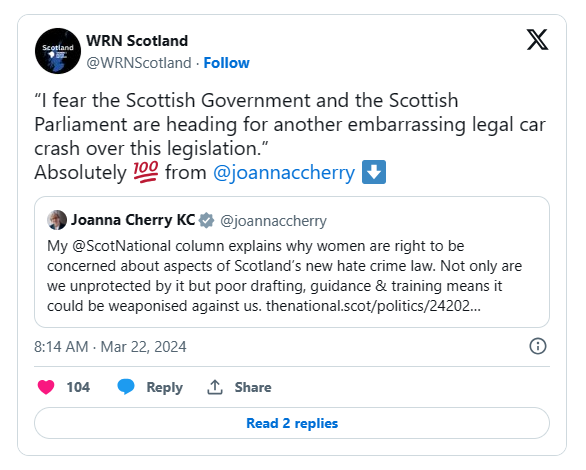
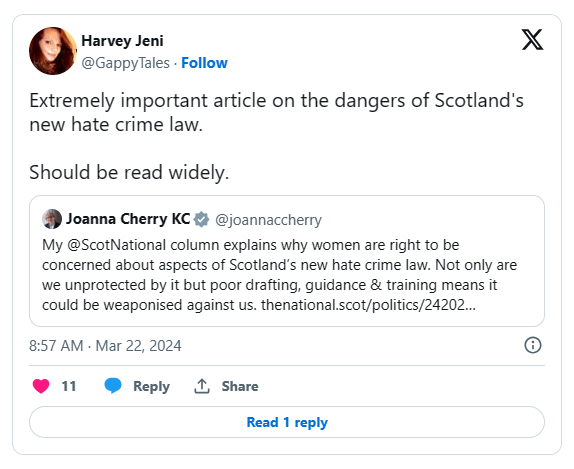
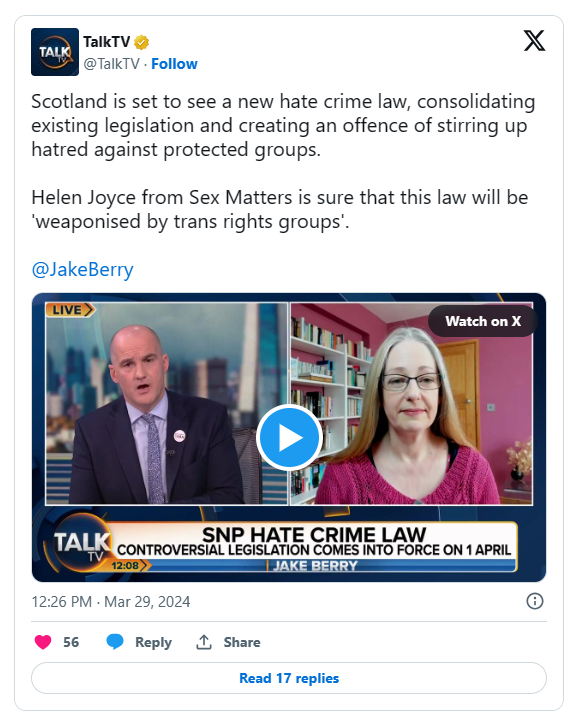
David Threadgold, chairman of the Scottish Police Federation, which represents 98% of all police officers in Scotland, told BBC Radio 4’s Today programme that the scale of calls since the implementation of the hate crime bill was “simply unmanageable”.
In the first official statistics published since the law came into force, Police Scotland said that it had received 7,152 online hate reports between April 1 and April 7.
However, it said that during the period, just 240 actual hate crimes, around 3.5 per cent of the reports made, had been recorded. A further 30 were recorded as “non-crime hate incidents”, a 66 per cent increase on the total received during the same period last year, when 18 were recorded by police.
If replicated through the year, this rate of reporting would mean ‘hate crimes’ surpassing the entire annual total of 416,000 crimes reported to police. Analysis by the Telegraph shows Police Scotland is already failing to solve an increasing number of shoplifting cases, sexual assaults and car thefts. Clear-up rates – referring to cases where there is enough evidence for criminal proceedings – for two-thirds of all offences have declined since 2011 including violent offences, fraud and rape.
“Police Scotland have gone public and said that on every occasion, reports of hate crime will be investigated,” Mr Threadgold said. “That creates a situation where we simply cannot cope at the moment. Officers have been brought back in to do overtime shifts, and the management of that is simply unsustainable.
“When you have vexatious complaints, people who look to weaponise this legislation or who make these complaints for personal gain or political point scoring, then that creates a problem for the police which can affect public satisfaction in my organisation,” Mr Threadgold continued.
Hello, welcome, and thank you to all the new members joining us since the Scottish Government activated its deeply illiberal and authoritarian Hate Crime Act.
— The Free Speech Union (@SpeechUnion) April 8, 2024
We’ve put an arrangement in place with a top firm of criminal lawyers in Scotland, so if any of our members are… pic.twitter.com/UTi3Zs3uMH
“Now, the First Minister in Scotland can talk about his confidence, and Police Scotland’s ability to deal with vexatious complaints as he has done, but what we have never seen before is the scale of the complaints are coming in around one piece of legislation.”
Police officers received just two hours of online training which Mr Threadgold said had not been adequate to equip them to make difficult judgements around complex issues such as how to balance freedom of speech.
“One of the biggest challenges that we’ve got in policing at the moment if you accept that the scale and the volume that we have got is simply unmanageable, is that we have not prepared our staff properly,” Mr Threadgold added.
“We’ve not given them the opportunities to ask the ‘what if’ questions during the training that has been provided by Police Scotland, to interpret this legislation to the satisfaction of the public.
“The confusion, the interpretation, that can exist by people who look at this new legislation through their own viewpoint, creates confusion for police officers in Scotland who are trying to deliver this law.”
As widely reported, almost 1,000 new Scottish members have joined the FSU in the past fortnight, most of them women, and all concerned at the threat to free speech posed by the country’s draconian new Hate Crime and Public Order (Scotland) Act.
In response we’ve set up a Hate Speech Hotline in case any of them get into trouble with the police about something they’ve said. We’ve also put an arrangement in place with Levy & McRae, a top firm of criminal lawyers in Scotland, so if any of our members are arrested or interviewed under caution for something speech-related we can come to their aid.
If you’re an existing FSU member, you can find the Hotline number, as well as detailed instructions about what to do if you’re arrested in Scotland for a speech-related offence in the following set of FAQs.
The Hotline number is also available to members in this separate set of FAQs, which answers questions about the new criminal offences created by the Hate Crime Act.
The Hate Crime and Public Order (Scotland) Act, which was activated on April Fool’s Day, broadens the offence of ‘stirring up racial hatred’, extending it to the protected characteristics of disability, religion, sexual orientation, age, transgender identity and ‘variations in sex characteristics’.
Putting aside race (which is handled slightly differently to the other protected characteristics) committing the ‘stirring up’ offence requires:
1) Behaviour or communication to another person of material that a “reasonable person” would consider threatening or abusive; and
2) Intention to stir up hatred against a group of persons defined by a protected characteristic.
As per the legislation’s protections for freedom of expression, it will not be deemed “abusive and threatening” to engage “solely” in “discussion or criticism” about age or any of the other protected characteristics.
Scots are also expressly permitted to voice “antipathy, dislike, ridicule or insult” for religion.
However, that carve-out does not apply to the legislation’s other protected characteristics, raising serious free speech concerns, not least for those who hold and manifest the gender critical belief that the category of biological sex must take precedence over a person’s ‘gender identity’ in policy and law.
Another free speech concern is that unlike the Public Order Act, which applies to England and Wales, Scotland’s hate crime legislation removes what’s known as the ‘dwelling defence’ (i.e., that an offence cannot be committed if both the defendant and the person threatened are in a private dwelling). This means that Scots can now be prosecuted for ‘stirring up’ hatred in their own home, which raises the spectre of children testifying against their gender critical parents in court.
The Bill won the backing of a majority of MSPs in March 2021, despite concerns that the entire section on stirring up hatred (section three) was “fundamentally flawed” and represented an “attack” on freedom of speech.
Activation of the legislation was then delayed while Police Scotland began the process of “training, guidance and communications planning”.
Two-and-half years later, in September 2023, the national police force established a dedicated hate crime unit to help identify, record and prosecute the new crimes created by the Act. It also began training its 16,400 officers in preparation for the Act’s activation.
A series of ‘third party reporting centres’ have also been established by Police Scotland, on the basis that victims or witnesses “sometimes… don’t feel comfortable reporting the incident to the police” and “might be more comfortable reporting it to someone they know”.
The nationwide network of walk-in snitching parlours are located everywhere from charities, council offices, caravan sites and housing associations – Glasgow’s easily offended can even drop-in to ‘Luke and Jake’, an LGBT+ sex-shop where specially trained staff are available seven days a week to help you report a ‘hate crime’.






